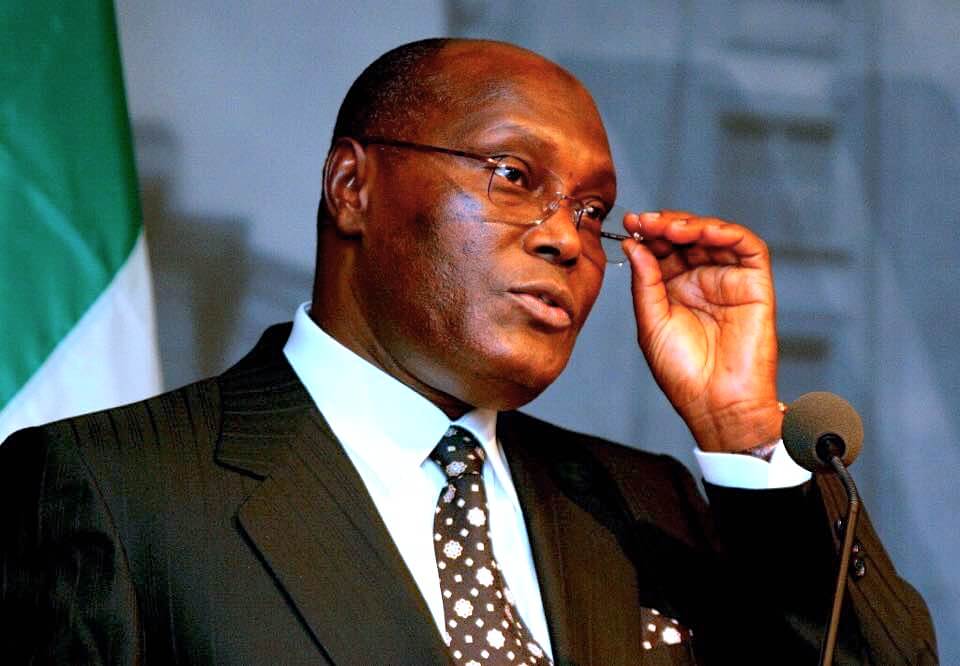The 2019 presidential standard-bearer of the Peoples Democratic Party (PDP), Atiku Abubakar, has identified five key areas where he intends to focus attention to drive growth and productivity in the Nigerian economy if elected president in 2019.
Atiku had on Sunday released a 63-page policy document tagged “Let’s Get Nigeria Working Again” where he outlined his proposed economic development agenda and how he intends to “build the economy of our dream”.
Advertisement
In the policy document, the former Vice President presented himself as having “a good grasp of the systemic challenges facing Nigeria,” of which he has set a six-year timeline to deal with.
The five key areas identified in the policy plan are: “Human capital development, Promoting economic diversification, Reducing infrastructure deficit, Reforming public institutions, and Competitive and open economic system.”
The PDP presidential candidate promised to increase the country’s Gross Domestic Product (GDP) to $900 billion before the end of 2025 by “increasing flow of FDI (Foreign Direct Investment) into non-oil sector, strengthening linkages between oil and nonoil sectors, promoting the new economy, expanded export base: products and destinations, and strengthening public-private partnerships.”
Atiku, whose running mate is the former governor of Anambra State, Peter Gregory Obi, went further to explain how he will achieve the almost 90% increases in the country’s GDP if voted into office.
Advertisement
In the policy plan, Atiku said by 2025, his prospective government would increase the inflow of direct foreign investment to a minimum of 2.5% through “achieving the lowest corporate income tax rate in Africa, Strengthening the credit guarantee initiatives of Infra-Credit by substantially increasing its capital base, strengthening the credit guarantee initiatives of Infra-Credit by substantially increasing its capital base, and ensuring that the granting of /qualification for tax incentives is automatic, according to predetermined, uniform, and clear criteria.”
In the agricultural sector, the former customs boss promised to improve the sector’s “access to financial services, through NIRSAL, by de-risking lending to the sector by commercial and development banks, and encourage investment in Agro-processing Cluster by offering concessional financing, tax breaks and seed funds.”
In the manufacturing sector, the presidential candidate pledged to “achieve a sustained increase in manufacturing output from 9% to 30% of GDP by 2025” as well as “reduce the sector’s dependence on imported raw materials. Looking inwards will promote value addition” by ensuring that “all major economic and investment policies are formulated after sufficient prior consultation with the organized private sector,” while enforcing vigorously the “buy made-in-Nigeria initiative by ensuring compliance with the relevant executive order by Federal Government”.
In the Oil and Gas, the policy plan stated plans by the PDP candidate to embark on partial privatization of the Nigerian National Petroleum Corporation (NNPC).
Atiku also proposed ‘New Economy’ where sectors such as Healthcare, Education, Ecommerce, Agriculture and Industry would be driven by ICT.
Advertisement
On how this, the former Vice President promised to “Establish a ‘Technology Support Programme’ (TSP) to be funded by a Diaspora Bond, develop a more effective and efficient Intellectual Property Rights (IPR) framework, produce a comprehensive policy on blockchain technology and cryptocurrencies, enhance ICT literacy initiatives from early school programmes to adult education, provide the right incentives for the establishment of business units by global multinationals”
In the area of jobs, Atiku claimed that close to 16 million people have either lost their jobs or are unable to get employed since current administration took power in 2015.
“Over 2 million new entrants join the labour force each year meaning the unemployed share of the labour force more than tripled in less than a decade: from 5.1% in 2010 to 18.8% in 2017,” stated the policy document.
On how this would be addressed, the for VP said he intends to “Launch a new, more efficient, cost-effective and sustainable national Entrepreneurship Development and Job Creation Programme, Target the creation of up to 3 million self and wage-paying employment opportunities in the private sector annually, Target all categories of youth, including graduates, early school leavers as well as the massive numbers of uneducated youth who are currently not in schools, employment or training, Create incubation centres, clusters and industrial/commercial hubs to provide a market place for MSMEs and SMPs, and Champion the repositioning and streamlining the activities of the existing Federal and State Government Job Creation Agencies.”
He also promises to ensure the “Speedy passage of the National Research and Innovation Fund Bill, Grants, loans or equity investments in small enterprises shall be provided either as start-up capital or to scale up innovations, Introduce, and actively promote, a Graduate Trainee Internship Programme (GTI), Improve the technical and financial capacity of the Industrial Training Fund (ITF).”
The former Vice President described poverty as a complex problem that “requires the concerted application of many solutions. Nigeria has vast natural resources, but our challenge remains harnessing these resources for the greatest good.”



